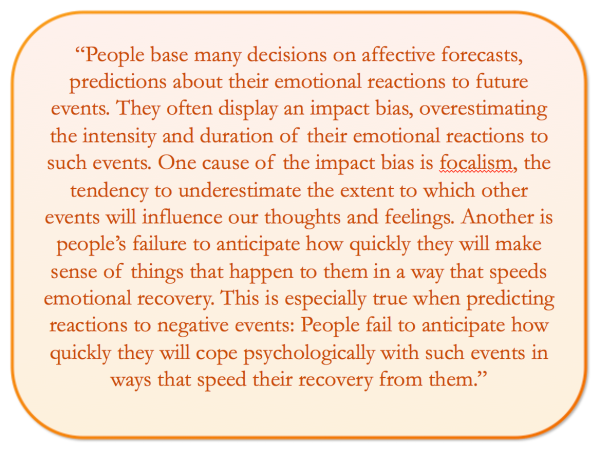Paying attention to the present moment, rather than constantly getting lost in ruminative fantasies, that we learn most and can be best prepared for our lives.

This is a powerful passage and has a great deal of resonance with mindfulness practice. Part of what we’re trying to do is to learn from life – but to learn, we need to be present. One definition of mindfulness is that it’s a state of mind where we can encode memories. Mindfulness is a kind of alertness where the attention can actually absorb what is happening, moment-by-moment.
The only influence we have on the future is how well we tend to the present. By tending to what’s here and what’s now, and learning from what’s here and now, we grow in ways that should help us meet the future most effectively.
Imagining the Future: How good are we at predicting our emotional responses?
So much of anxiety is about imagining the future. But how good are we at imagining our emotional future? How good are our predictions about how a ‘good’ or ‘bad’ event might make us feel? There is a whole body of research dedicated to these types of questions called affective forecasting. Daniel Gilbert, the Harvard psychologist and author of Stumbling on Happiness, has become famous for this work. As it turns out, while we tend to be accurate guessing whether a particular event is likely to make us feel positive or negative, we tend to make important errors in other aspects of our predictions. Specifically, we tend to overestimate the impact of particular emotional events. That is, we believe that a particular event will have both a more intense and enduring effect on our emotional life. Here is a summary of one of Gilbert’s articles:

What is being suggested here is that we are actually more resilient than we tend to believe. We assume that we’ll have more trouble coping than we tend to have. When faced with a challenging situation, the mind quickly makes meanings and interpretations that help soften the impact and we feel better much faster than we tend to anticipate. This is important for us to absorb.
All the Forks in All the Roads

And sorry I could not travel both
And be one traveler, long I stood
And looked down one as far as I could
To where it bent in the undergrowth;
Then took the other, as just as fair,
And having perhaps the better claim,
Because it was grassy and wanted wear;
Though as for that the passing there
Had worn them really about the same,
And both that morning equally lay
In leaves no step had trodden black.
Oh, I kept the first for another day!
Yet knowing how way leads on to way,
I doubted if I should ever come back.
I shall be telling this with a sigh
Somewhere ages and ages hence:
Two roads diverged in a wood, and I–
I took the one less traveled by,
And that has made all the difference.
It’s a lovely poem – but we want to make a different point than the one that’s usually made about this poem. When we pay attention to our minds, it feels like we’re always coming to a fork in the road. Each decision, each uncertainty, each possibility – it seems we’re at a new fork, standing before two roads that diverge. We usually assume that one road is the right way and one road is the wrong way – and if we just think hard enough, we’ll figure out which is which. But is this true? How many times do we truly come to fork in the road that is truly an important fork? And can we always know which is the “right” path?
Some of what mindfulness practice shows us is that there are actually fewer forks than we think and that even what seemed like a fork, in retrospect, may not be of major importance. We probably have all had that experience where we thought our lives were riding on the outcome of something specific – but later realize that it actually didn’t matter much which way it turned out. Both roads have joys and sorrows. Both roads have pleasure and pain and gain and loss. Sometimes the road that seems less preferable has things to teach us we could never imagine.
Interesting. I believe that there is no right or wrong just difference, and as you say Mark it matters little what choices we make since all is experience which is why we are here. That is not our personal experience, but the experience of the soul which is admittedly in the hands of the spirit or shall we say mind or consciousness. Whatever the choice, we should get used to the elevation of the consciousness to the level of happiness. This elevation is again why we are here as it leads us or the totality of humanity on the pathway to Ascension.
Love, David
Well written Mark, our journey is correct regardless.
If I choose to take the left fork in the road, knowing that it is full of bandits…I just may save a princess from them, be rewarded with great things for her return, and be happily married to her forever more. Showing me the path to unconditional love within.
Or maybe the right fork, known to be safer, which takes me through many trials in life, also showing me the path to unconditional love within.
Which is right or wrong….our path is the one we choose…and take…unconditional love will do the rest 🙂
Thank you for sharing Mark, a great post 🙂
Blessings to you Mark and your continued journey of self discovery 🙂 Namaste, Mark